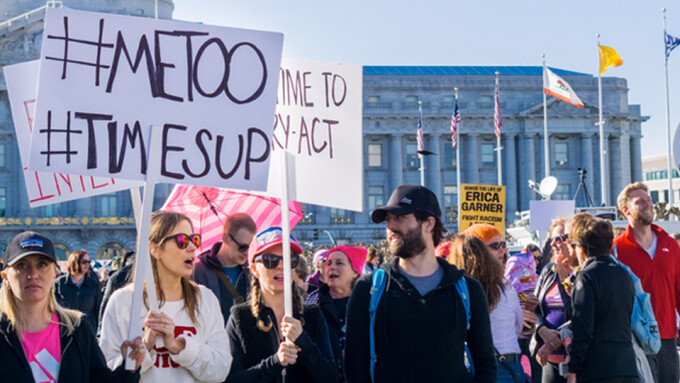It turns out that pot isn’t the only vice that Maureen Dowd can’t handle. The writer, a mainstay of The New York Times op-ed section, ranted to The Irish Times yesterday about the driving role pornography supposedly plays in the sex lives — including non-consensual experiences — of young women.
Dowd, who is herself neither a young woman nor has experienced modern life as one, somehow feels entitled to say that it’s some new and ubiquitous phenomenon that “women decide they’re not attracted to a guy they’re nestling with but they go ahead and have sex anyhow.”
In “Porn culture is making sex bleak and transactional,” Dowd quotes Baby Boomer Joanna Coles, “former editrix of Cosmopolitan and Marie Claire,” on her similarly irrelevant opinions about millennial and Gen X sex lives. “Intimacy,” she says, “is not easy to create in a hook-up.” With this, Dowd establishes a 1950s-era definition of “intimacy,” which to her seems to mean only one thing — traditional, monogamous interaction meant to set off long-term relationships.
The writer seems not to consider the evolving nature of intimacy and the widening acceptance of its different guises. Intimacy can exist for one night, one minute, one second — and it’s not something everyone even wants. There’s nothing wrong with that, obviously, and what Dowd seems not to recognize is that there’s no “wrong” reason for having consensual sex with someone you may not be wholly enamored with.
It’s only ever someone’s personal decision who they sleep with, and the reason is theirs and theirs alone to legitimize. Like someone’s mind and not their face? Go ahead. Want to feel a temporary connection with another human being, even if it’s not for the long run? Sure. Just feeling like boning? By all means. Doing sex work? Do it! Dowd’s dowdiness just can’t keep up with the idea that younger folk just might be looking for something other than a Mrs. label.
She and Cole say that at the crux of this loss of intimacy sits pornography, that its presence along with that of online dating makes “women interchangeable.” Cole suggests that “there’s a new sense in which young women feel that they are now in competition with porn, and if they don’t put out, it’s easy for the guy to go home, log into Pornhub and get what he needs there.”
As if all women want so badly to be loved that they would pursue a man who doesn’t want them! It’s straight out of some bad mid-century melodrama with exactly that level of understanding of young women. Naturally, Dowd and her interviewee make the classic, embarrassing error of equating viewing pornography with actually having sex and moreover assume that it’s only men who are watching (heaven forbid Dowd go and look at data from Pornhub itself, which reports that women are watching more and more porn as of 2017). Naturally, Dowd doesn’t bother to interview sex workers or sex-positive women.
To make matters worse, she decides to turn her attention to the #metoo movement, suggesting that it’s that exact pornography-induced lack of intimacy that leads to sexual assault. Ignoring the fact that sexual assault is an act of violence, not sex, she blames women for drinking too much and being unwilling to leave situations where they feel threatened or a lack of intimacy.
She mentions abuse by Aziz Ansari, which was reported by an anonymous victim a few months ago. She flagrantly dismisses Ansari’s actions, mentioning that the woman who had given the account “was distressed by his arbitrary choice of white wine at dinner,” focusing on matters of oenology rather than the actual matter at hand: what followed dinner.
“So you’d rather have bad sex with someone who doesn’t appeal to you than find a way to extricate yourself?” she asks, as if assault is simply “bad sex.” “You can Lean In but you can’t Walk Out?” It’s an absolutely heinous set of questions to ask of people who have experienced being in the grips of an assault, as anyone who has been there would know.
Dowd also mentions Stormy Daniels, choosing selectively to quote Daniels’ internalized victim-blaming and translating what is clearly socially imposed self-doubt into a supposed legitimization of it having been “a bad decision [to go] to someone’s room alone.”
For all of her supposed knowledge about intimacy and interpersonal relationships, Dowd seems not to be cognizant of the damage her cognitively dissonant, puritanically panicked opinions are doing to people who have been assaulted as well as sex workers just trying to do their jobs.
Connecting pornography with assault, which Dowd indirectly does, has not even been proven. Despite the ever-present hysteria over adult entertainment, it’s actually been shown that there is a correlation between the arrival of the internet (and widespread pornography access) with what the Justice Department reports is a lowered rate of sexual assault.
To top it off, as if all of this nonsense somehow isn’t enough, Coles goes off the rails and suggests that “20 percent of young women are on antidepressants” and that there “have to be ad campaigns about consent before sex” all because of porn. How could anyone possibly take her seriously after that?
Dowd’s isn’t a casual opinion piece. In a time when laws are gearing up to lash out against sex workers, it’s an all-out assault.







